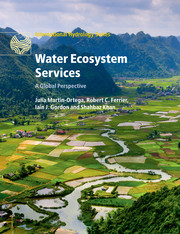Book contents
- Frontmatter
- Contents
- List of contributors
- Preface
- 1 Introduction
- 2 What defines ecosystem services-based approaches?
- Part I Addressing global challenges
- 3 Assessing climate change risks and prioritising adaptation options using a water ecosystem services-based approach
- 4 Operationalizing an ecosystem services-based approach for managing river biodiversity
- 5 Water for agriculture and energy: the African quest under the lenses of an ecosystem services-based approach
- Part II Applying frameworks for water management and biodiversity conservation under an ecosystem services-based approach
- Part III Assessing water ecosystem services
- Part IV Broadening the perspective
- Index
- Plate Section
- References
5 - Water for agriculture and energy: the African quest under the lenses of an ecosystem services-based approach
from Part I - Addressing global challenges
Published online by Cambridge University Press: 05 May 2015
- Frontmatter
- Contents
- List of contributors
- Preface
- 1 Introduction
- 2 What defines ecosystem services-based approaches?
- Part I Addressing global challenges
- 3 Assessing climate change risks and prioritising adaptation options using a water ecosystem services-based approach
- 4 Operationalizing an ecosystem services-based approach for managing river biodiversity
- 5 Water for agriculture and energy: the African quest under the lenses of an ecosystem services-based approach
- Part II Applying frameworks for water management and biodiversity conservation under an ecosystem services-based approach
- Part III Assessing water ecosystem services
- Part IV Broadening the perspective
- Index
- Plate Section
- References
Summary
5.1 INTRODUCTION
According to the Millennium Ecosystem Assessment (2005), most changes in ecosystems have been made to meet a dramatic growth in the demand for food, water, timber, fiber, and energy (e.g. fuelwood and hydropower). As the global population grows, demand for these provisioning ecosystem services will continue to increase, especially the demand for food and energy. In terms of water, the global challenge is to develop these resources to their full potential to sustain provisioning services such as food and energy, while minimizing the impact on other ecosystem services.
This chapter looks at this longstanding and ever-increasing emergency under new lenses, that of ecosystem services-based approaches (as defined in this book), and reflects on the opportunities and limitations that are arising from this issue. In the first section of the chapter, we reflect on how the provisioning of services for food and energy have been developed to the detriment of other ecosystem services, such as erosion control, water regulation, and purification, and we explore how the impacts derived from this could be minimized. The second section grounds the previous discussion by placing the focus on the use of water for the production of food and energy in the African continent.
5.2 FINDING THE RIGHT BALANCE ACROSS ECOSYSTEMS SERVICES
Water plays a critical role in sustaining provisioning services, notably in the form of food and energy (see Box 5.1). The Millennium Ecosystem Assessment (2005) identified that growth in agriculture has been responsible for much of the ecosystem degradation witnessed. Increased agricultural production has been achieved with both the intensification (Figure 5.1) and expansion (Figure 5.2) of agriculture, both contributing to the loss of other provisioning, regulating, cultural, and supporting services. In this section we reflect on the need to find the right balance across ecosystem services, looking at the trade-offs between food, energy production, water, and other ecosystem services, and on some of the proposals that have been made to address these trade-offs.
- Type
- Chapter
- Information
- Water Ecosystem ServicesA Global Perspective, pp. 35 - 46Publisher: Cambridge University PressPrint publication year: 2015

